
Monasticism is one of the most fundamental institutions of Buddhism. Monks and nuns are responsible for preserving and spreading Buddhist teachings, as well as educating and guiding Buddhist followers. Buddhist monasteries emerged from the practice of vassa, the retreat undertaken by Buddhist monks and nuns during the South Asian rainy season. These monasteries gradually developed into centers of learning where philosophical principles were developed and debated.
- Yumbulagang

According to a legend Yumbulagang was the first building in Tibet and the palace of the first Tibetan king, Nyatri Tsenpo. Its name means “Palace of Mother and Son” in Tibetan. Under the reign of the 5th Dalai Lama the palace became a monastery of the Gelugpa School. Sadly, it was heavily damaged and reduced to a single storey during the Cultural Revolution but was reconstructed in 1983.
- Erdene Zuu Monastery
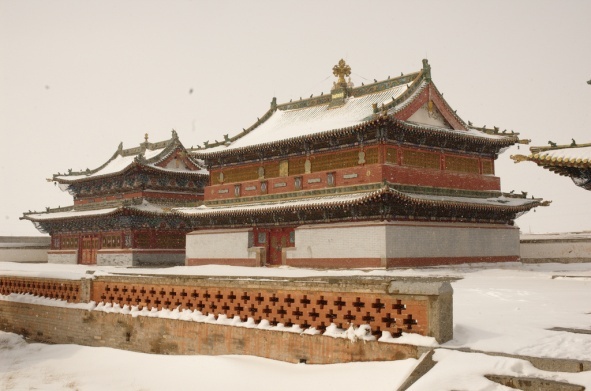
The Erdene Zuu Monastery is probably the most ancient surviving Buddhist monastery in Mongolia. It was built in 1585 by Abtai Sain Khan, at the introduction of Tibetan Buddhism into Mongolia. Stones from the ruins of Karakorum were used in the construction. It is surrounded by a wall featuring 100 stupas. The number 108, being a sacred number in Buddhism, was probably envisioned, but never achieved. Under communist rule Erdene Zuu was allowed to exist as a museum only. However, after the fall of communism in Mongolia in 1990, the monastery was turned over to the lamas and Erdene Zuu again became a place of worship.
- Ganden Monastery
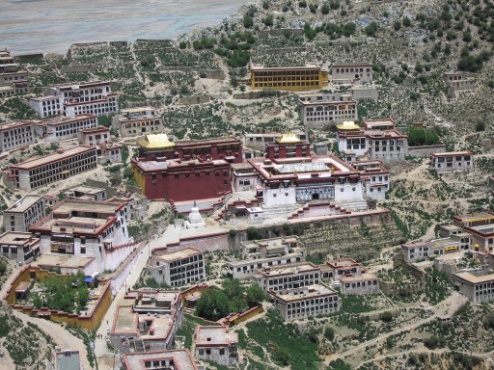
Ganden Monastery is one of the ‘great three’ university monasteries of Tibet, located at the top of Wangbur Mountain at an altitude of 4,300 meters (14,107 feet). The other two are Sera Monastery and Drepung Monastery. Being the farthest from Lhasa of the three university monasteries, Ganden traditionally had a smaller population with some 6,000 monks in the early 20th century. In 1959 the monastery was completely destroyed by the Red Guards and the mummified body of Tsongkhapa, the founder of the Monastery, was burned. Reconstruction of the Monastery has been continuing since the 1980s.
- Key Gompa
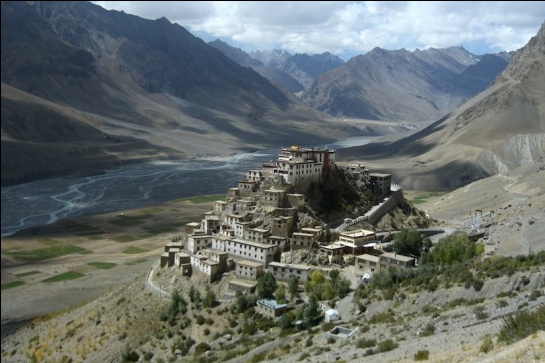
Key Gompa or Ki Monastery is a thousand year old Tibetan Buddhist monastery located prominently on top of a hill at an altitude of 4,166 meters (13,668 feet) in the Spiti Valley. The village of Kibar below the monastery is said to be the highest village in India. The monastery has been attacked many times during its long history by Mongol and other armies and was also ravaged by fire and earthquakes. The successive trails of destruction and restorations have resulted in a box-like construction, and the monastery looks like a fort, where temples are built on top of one another.
- Lama Temple
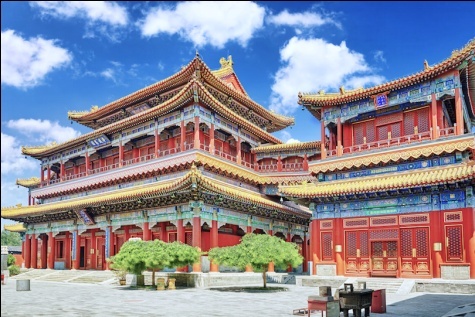
The Lama Temple (Yonghe Temple/Palace of Peace and Harmony), located in the northeastern part of Beijing, is one of the largest Tibetan Buddhist monasteries in the world. The temple was built by Chinese emperors who harbored a deep fascination for the Tibetan version of Buddhism. Over the years, many Tibetan and Mongolian monks lived and taught here, and there are still monks in residence today. The temple contains a 26 meter (85 feet) tall statue of Maitreya Buddha carved from a single piece of white sandalwood.
- Thikse Monastery
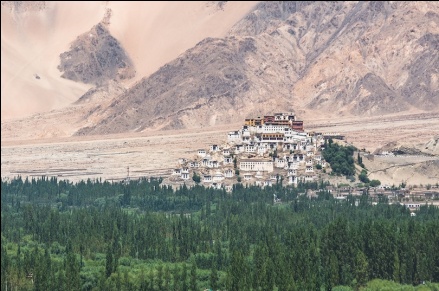
Thikse Monastery is a Tibetan Buddhist monastery of the Yellow Hat sect noted for its resemblance to the Potala Palace in Lhasa. The monastery is located at an altitude of 3,600 meters (11,800 feet) in the Indus valley in India. It is a 12-storey complex and houses many items of Buddhist art such as stupas, statues and wall paintings. One of the main points of interest is the Maitreya Temple which is installed to commemorate the visit of the 14th Dalai Lama to the Thikse monastery in 1970.
- Punakha Dzong
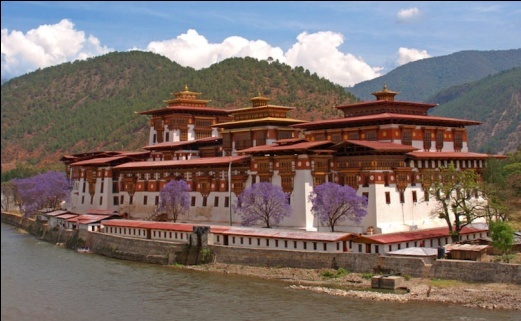
Majestically standing on an island between the confluence of the Pho Chhu and Mo Chhu rivers, Punakha Dzong is one of the most photogenic of all Bhutan’s ancient dzongs. A dzong is a combination of both a fortress and monastery and one is located in every district in Bhutan. Punakha Dzong, like any other dong, serves several purposes including protection for the region, an administrative seat for the government and as the winter home of the monastic body. It is joined to the mainland by an arched wooden bridge, and contains many precious relics from the days when successive kings reined the kingdom from this valley.
- Taung Kalat
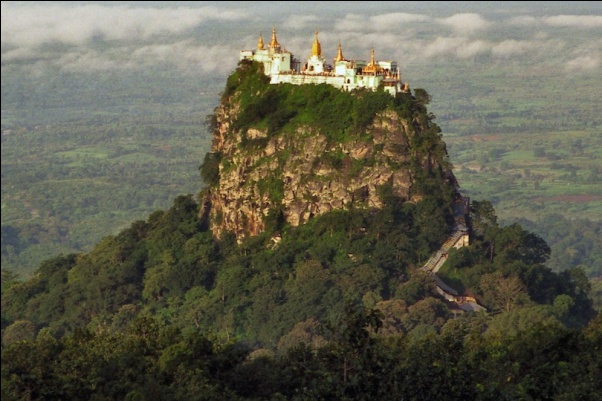
Built atop an extinct volcano plug, the Buddhist monastery of Taung Kalat is one of the most breathtaking sites in Burma. To reach the monastery, visitors must climb the 777 steps to the summit. Along the way are a multitude of Macaque monkeys expecting treats. From the top of Taung Kalat, one can enjoy a panoramic view. One can see the ancient city of Bagan and the massive solitary conical peak of Mount Popa, the volcano that actually caused the creation of the volcanic plug.
- Taktsang Dzong
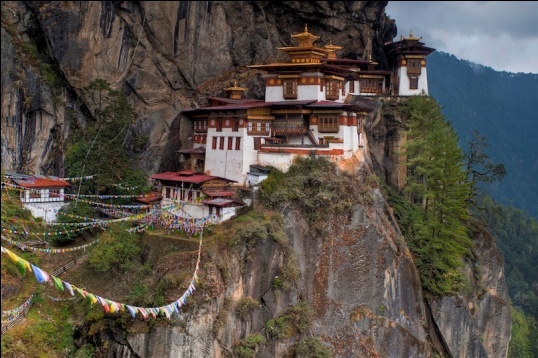
Situated on the edge of a 900 meter (3,000 feet) cliff, the Taktsang Monastery or Tiger’s Nest creates an impressive sight, and is the unofficial symbol of Bhutan. It is about 2-3 hour, totally up-hill hike from the parking lot to the monastery. According to a legend Guru Rinpoche flew to this location from Tibet on the back of a tigress and Taktsang was consecrated to tame the Tiger demon. The first monastery was not constructed until 1692. In 1998 a tragic fire destroyed most of the original buildings, but these have since been painstakingly restored to their former glory.
- Hanging Monastery
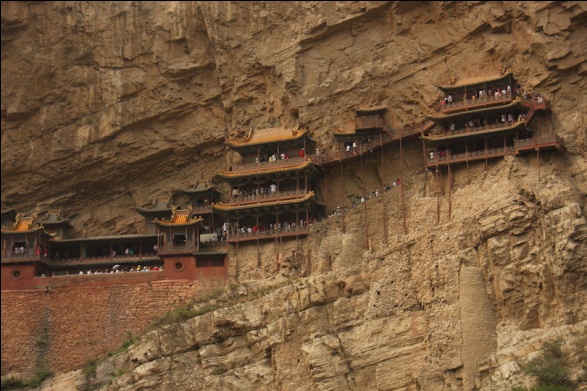
Perched precariously halfway up a cliff some 75 meters (246 feet) above the ground, the Hanging Monastery is one of the most remarkable sights in China. Consisting of a complex of 40 rooms linked together by mid-air corridors and walkways, this remarkable monastery appears to be glued to the side of a sheer precipice. The name ‘hanging’ may be misleading though as it’s actually supported by stilts rather than built into a cliff. The monastery was built in the 5th century and has been hanging here for 1500 years. Over its long history many repairs and extension led to its present day scale.
Source: tourpia.com




